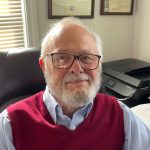[1] In this year of 2003 the synodical assemblies of the ELCA, the assembly of the Lutheran World Federation, and the Churchwide Assembly of the ELCA have all lifted up the common theme: “Making Christ Known for the Healing of the World.” In all these venues one heard eloquent testimony to the hurts of a world so desperately in need of healing. Hunger, poverty, violence, disease, injustice, oppression, the degradation of the environment, and spiritual morbidity were all voiced as concerns for the church’s agenda. Bringing Christ to the world means both telling the story and doing the story.
[2] The recently published brochure on the work of the Division for Church in Society places the theme, For the Healing of the World, and the Tenth Anniversary of Caring for Creation together on its cover. The visual proximity of the two themes enables us to see an important connection between the care of the earth and the care of its peoples, its communities, and their mutual health and well-being. The catalogue of hurts mentioned above is a catalogue of interconnected needs.
[3] There is, then, ecology in the broader sense. It involves recognition not only that natural biological systems exist in interaction and are affected by human behaviors that degrade or alter those systems but also that unjust and violent human behaviors within the human community have traumatic effects on the environment as their by-product. Insofar as violence and injustice create conditions of hunger, poverty, and disease they create other conditions unfavorable to caring for creation. The ensuing degradation, in turn, fosters the development of poverty, hunger, and disease, all nutrients in the sort of soil that is fertile for the sprouting of violence and oppression.
[4] The social statement, Caring for Creation: Vision, Hope, and Justice, makes many of these connections. In the decade since its adoption these connections have been even more widely recognized, as exemplified by a document such as the Earth Charter. If there has been a growing sense of the awareness of this broader understanding of ecology, what else can we say about the last ten years? One example will have to suffice.
[5] In the State of the World 1993 report of the Worldwatch Institute one author voiced the his concern about the threats of climate change. Over against skepticism about this as a clearly established problem, he encouraged industry to create new jobs and new markets by pursuing energy efficient technologies to reduce carbon emissions.
[6] Ten years later the 2002 report is clear that, whatever doubts may have lingered in the past about the reality of global warming, we now have more and more persuasive evidence that this is a reality.
[7] The good news in this 2002 report is that more industries have now accepted the reality of climate change and are more ready to build the cost of efficiency into the cost of doing business. They are ready to see the need for efficiency as a market opportunity.
[8] The bad news is that thus far the signatories to the Kyoto agreement in the category of developed nations have reduced carbon emissions by just 1.7% toward the 2008-12 goal of 5.2% and the U.S., the largest emitter, contributed 24% of all carbon emissions in 2000, a figure 2% higher than the previous year.
[9] How do we find a way forward in this and other areas of concern? One writer in State of the World 2002 states, “In order to tap various opportunities for reducing greenhouse gas emissions, governments will need to overcome the many technical, economic, political, social, behavioral, and institutional barriers to change.” The key is in the connections. But, government can’t do this alone. The social statement provides inspiration and direction for our call to help people see the connections as an integral part of our witness.


